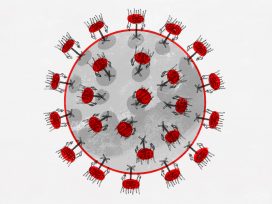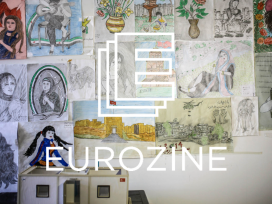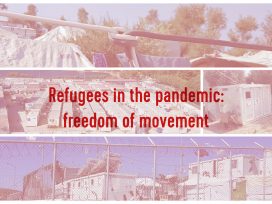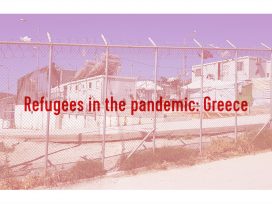5 articles

This is what it looks like when globalization collapses. The political and economic disasters brought about by COVID-19 – a crisis of our own making – have exacerbated pre-existing social problems: disinformation is spreading like bushfire; marginalized refugees have been abandoned by Europe, Roma are being over-policed, the homeless under-served, LGBTQ people outed and ousted, sex workers scapegoated. The crisis has been abused to silence press and public dissent, and as vaccination progresses, questions of global justice are intertwined with health crises.
But this unprecedented situation also offers a chance to fundamentally restructure our economies, rethink how we work altogether, appreciate what is really essential, and put social connections up front and centre.
Eurozine looks into the political and cultural factors behind the COVID-19 pandemic and reports from the frontiers.


Sensationalism has focused on fistfights over toilet rolls, but the real story is the withdrawal of democratic oversight, and how little public resistance there is to the declaration of martial law. Power granted is power conceded; and power relinquished is power reclaimed with difficulty.

The coronavirus pandemic took the spotlight from the refugee crisis on the Greek border with Turkey in early March long before a political solution could be reached. Now, the two situations have merged into a poly-crisis.

The Ukrainian government’s pandemic response has got dramatically different reviews. The Zelensky administration declared a strict lockdown early on and has mobilized big business, enjoying wide popular support, but anti-corruption activists and established intellectuals remain suspicious. Nataliya Gumenyuk asks who to trust.

COVID-19 found societies not only unprepared but also unaware. Koray Caliskan and Donald MacKenzie ask why social sciences have taken so little interest in pathogens. In comparing humans and viruses, they reveal the risks of an overly anthropocentric focus. Perhaps it’s time to rewrite the books?

Overwhelmed and underserved camps are in no condition to prevent COVID-19 outbreaks. The European Union’s response so far is falling short in protecting refugees from the pandemic. The Eurozine miniseries reviews recent restrictions on mobility.

Social distancing is impossible when 1200 people share a single tap. The Greek government is using the pandemic to segregate refugees from citizens but hasn’t provided the means for prevention. If this politics of abandonment continues, grossly overcrowded camps will become death traps. The Eurozine miniseries reports from Greece.

The list of signatories to the statement issued by members of the European People’s Party calling for the expulsion of Fidesz, following Hungary’s ‘Coronavirus Protection Act’, contained some notable absences. Realignments on the European right are making the EPP’s lack of unanimity on the question of national populism untenable.
While the rest of Europe is trying to keep citizens from mass economic ruin, the Hungarian government uses the coronavirus for another power grab, also coming down on theatres and transgender people. Orbán knows he can get away with it because he offers a key political product.
Italy is now more closed than Matteo Salvini ever dreamt it would be. Prevention is focused on citizens, but ‘stay at home’ orders are a mockery for asylum seekers and homeless people, whose servicing is becoming impossible. The government has had to reach out to formerly denigrated NGOs for help. Our miniseries on refugees and the coronavirus pandemic continues.
The European response to coronavirus so far has been focused on nation states and citizens, leaving stateless refugees without means of prevention. Overcrowded and underserved camps have posed a health hazard already before the virus. Eurozine launches a miniseries to report on refugees’ situation on the EU’s frontiers.
As the world’s attention turns to fighting COVID-19, many leaders want to fight the media instead. ‘Index’ is monitoring attacks against journalists and freedom of the press, and calls for reports.
There is nothing ‘natural’ about the coronavirus pandemic: global capitalism has created it. Containment measures of social distancing bear the characteristics of a general strike. It can serve as an experiment taking back control over our own time, Bram Ieven and Jan Overwijk argue.
Not only the infected are in danger, hospitals don’t have capacity to deal with other emergencies either. Caskets are piling up as the cemetery cannot keep up with the number of deaths every day. From social workers to friars to cleaning staff, everyone who serves the sick are at risk at the epicentre of the contagion in Bergamo province.
Decades of cuts to public health are now exposed as the spread of the coronavirus overwhelms the system. Europe has been lucky to observe hurricanes, floods and plagues of the past decades from afar, but geography or wealth doesn’t safeguard us from epidemics. How we treat our least powerful now will be telling about what we can hope for.
From genocidal accusations to alleged cures, the coronavirus pandemic is accompanied by a swathe of conspiracy theories. These are perpetrated not only by clickbait websites but also authoritarian regimes who exploit the scare for political purposes and try to shift the blame from their failing responses. An international survey and a detailed case study.



